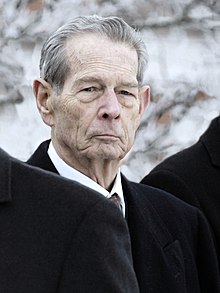Mihai I
| Michael I | |
|---|---|

King Michael in 2007
|
|
| King of Romania | |
| 1st reign | 20 July 1927 – 8 June 1930 |
| Predecessor | Ferdinand I |
| Successor | Carol II |
| Regents |
See
|
| 2nd reign | 6 September 1940 – 30 December 1947 |
| Coronation | 6 September 1940 |
| Predecessor | Carol II |
| Successor | Monarchy abolished |
| Born |
25 October 1921 Peleș Castle, Sinaia, Romania |
| Spouse | Princess Anne of Bourbon-Parma (m. 1948; d. 2016) |
| Issue |
Crown Princess Margareta Princess Elena Princess Irina Princess Sophie Princess Maria |
| House | Hohenzollern-Sigmaringen |
| Father | Carol II of Romania |
| Mother | Princess Helen of Greece and Denmark |
| Religion | Romanian Orthodox |
| Signature | |
Michael I (Romanian: Mihai I [miˈhaj]; born 25 October 1921) is a Romanian former monarch who reigned as King of Romania from 20 July 1927 to 8 June 1930 and again from 6 September 1940 until his abdication on 30 December 1947.
Shortly after his birth, Michael's father Prince Carol had become involved in a controversial relationship with Magda Lupescu. In 1925, Carol was eventually pressured to renounce his rights to the throne and moved to Paris in exile with Lupescu. In 1927, Michael ascended the throne following the death of his grandfather, Ferdinand I. As he was still a minor, a regency council was instituted which comprised his uncle, Prince Nicholas; the Patriarch Miron Cristea; and the president of the Supreme Court, Gheorghe Buzdugan. The council proved to be ineffective and in 1930, Carol returned to Romania and replaced his son as king. As a result, Michael returned to being heir apparent to the throne and was given the additional title of Grand Voievod of Alba-Iulia.
Carol II was deposed in 1940, and Michael once again became king. Under the government led by the military dictator Ion Antonescu, Romania became aligned with Nazi Germany. In 1944, Michael participated in a coup against Antonescu, appointed Constantin Sănătescu as his replacement, and subsequently declared an alliance with the Allies. In March 1945, political pressures forced Michael to appoint a pro-Soviet government headed by Petru Groza. From August 1945 to January 1946, Michael went on a "royal strike" and unsuccessfully tried to oppose Groza's Communist-controlled government by refusing to sign and endorse its decrees. In November, Michael attended the wedding of his cousins, the future Queen Elizabeth II of the United Kingdom and Prince Philip of Greece in London. Shortly thereafter, on the morning of 30 December 1947, Groza requested a meeting with Michael where he was forced to abdicate. Michael was forced into exile, confiscated of his properties, and stripped of his citizenship. He married Princess Anne of Bourbon-Parma in 1948 with whom he had five daughters and eventually settled in Switzerland.
...
Wikipedia
